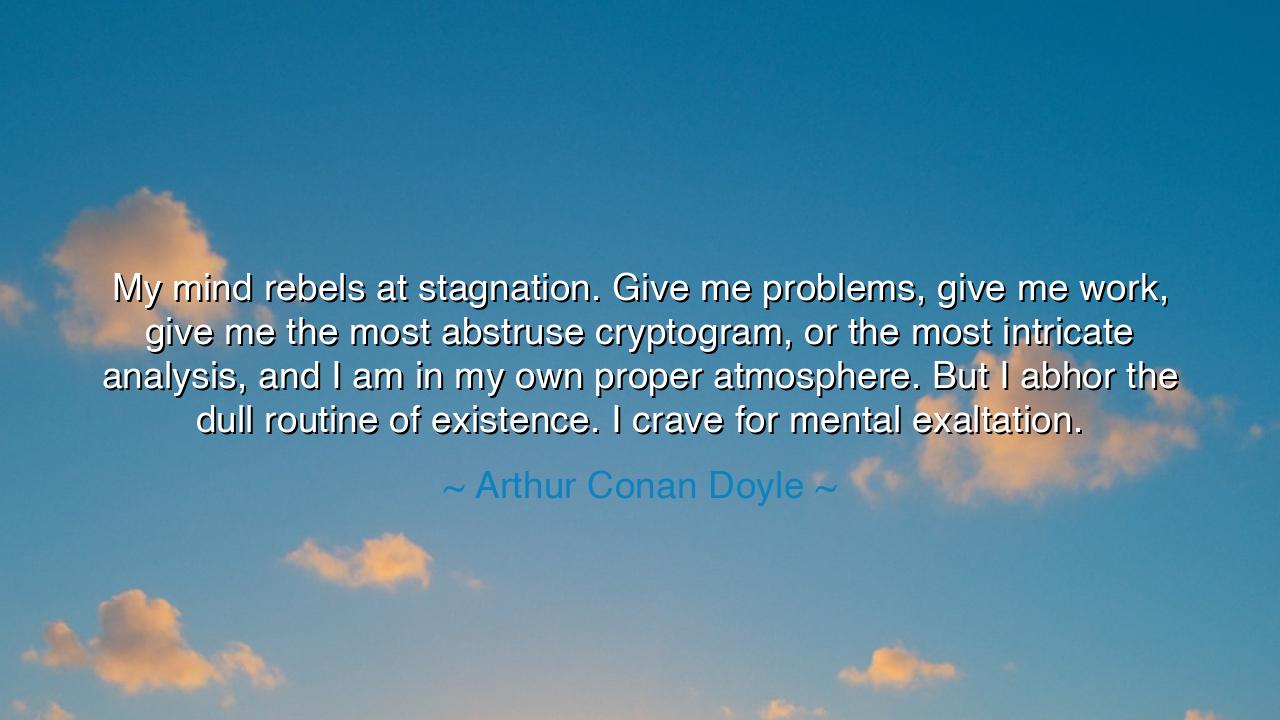
My mind rebels at stagnation. Give me problems, give me work
My mind rebels at stagnation. Give me problems, give me work, give me the most abstruse cryptogram, or the most intricate analysis, and I am in my own proper atmosphere. But I abhor the dull routine of existence. I crave for mental exaltation.






“My mind rebels at stagnation. Give me problems, give me work, give me the most abstruse cryptogram, or the most intricate analysis, and I am in my own proper atmosphere. But I abhor the dull routine of existence. I crave for mental exaltation.” Thus wrote Arthur Conan Doyle, through the voice of his immortal creation, Sherlock Holmes—a mind like lightning trapped within the fragile vessel of man. In this declaration, we hear not merely the voice of a detective, but the cry of every soul born with the fire of intellect, the hunger for challenge, the refusal to let the spirit grow idle and stale. It is the anthem of those who would rather suffer from too much thought than perish from too little purpose.
At its heart, this quote is a meditation on the nature of restlessness—the divine dissatisfaction that drives the seeker, the thinker, and the creator. To the common man, peace lies in comfort and routine. But to the restless mind, peace is death. Such a soul must labor not for money, not even for recognition, but for the sheer joy of the pursuit of understanding. It must wrestle with riddles, question what others accept, and find exaltation not in pleasure, but in thought itself. Holmes, in Doyle’s imagination, was the embodiment of this truth: a man whose greatest torment was not danger, but boredom.
To rebel against stagnation is to refuse the slow decay that comes when the mind is left unchallenged. In the ancient world, the philosophers of Greece taught that the mind, like a sword, grows dull when unused. Aristotle himself spoke of contemplation as the highest form of life, for it elevates man from mere existence to participation in the divine. The dull routine of existence, as Doyle writes, is the slow death of the creative soul. Without struggle, thought loses its edge; without questions, knowledge turns to dust. To live fully is not merely to breathe, but to seek, discover, and create.
Consider Leonardo da Vinci, that eternal example of the ever-curious spirit. He painted when others slept, dissected corpses to study anatomy, sketched machines that would not exist for centuries. His notebooks overflowed with ideas—questions upon questions, wonders upon wonders. He could not be content with a single craft, for his mind rebelled at stagnation. The same hunger that burned in Holmes burned in Leonardo: an unquenchable desire to see beyond the obvious, to feel the exaltation of discovery. His restlessness gave birth to genius; his dissatisfaction became the womb of progress.
Doyle’s words also carry a warning. For those whose minds burn too brightly, the world can seem slow, heavy, and colorless. The craving for mental exaltation can be both a gift and a torment. The wise must learn balance—to channel that inner fire into creation rather than destruction. Holmes himself, in moments of stillness, fell prey to melancholy and vice, for his mind demanded ceaseless motion. Such is the burden of brilliance: when life’s puzzles fall silent, the spirit begins to eat itself. Therefore, one must learn not only to seek new challenges, but to find peace in reflection, and purpose in the intervals between storms.
Yet there is glory in such a life. The abhorred routine may bring comfort to many, but it brings no greatness. Civilization itself was built by those who could not bear stagnation—by thinkers, inventors, explorers, and poets who sought new horizons because the old ones no longer satisfied their gaze. Every discovery, every invention, every act of genius was born from this sacred restlessness, this refusal to be content with “enough.” The craving for mental exaltation is the mother of progress and the heartbeat of human evolution.
So, my child of thought and fire, heed this lesson: do not fear your restlessness—it is the mark of the living mind. When you grow weary of routine, when your heart hungers for challenge, do not silence it. Seek new problems to solve, new ideas to build, new mysteries to unravel. Read deeply, question boldly, think freely. But also, remember to rest not in idleness, but in contemplation—to let your thoughts mature as fruit ripens in the sun.
For the mind that never stops learning never truly ages. To crave mental exaltation is to live in perpetual dawn, always on the edge of discovery, always reaching for something higher. Be like the flame that consumes, not the ember that fades. Let your curiosity be your compass and your courage your fuel. For in the end, as Doyle reminds us, it is not danger nor hardship that defeats the soul—it is stagnation. And the greatest rebellion of all is to keep thinking, striving, and dreaming until the very end.






AAdministratorAdministrator
Welcome, honored guests. Please leave a comment, we will respond soon